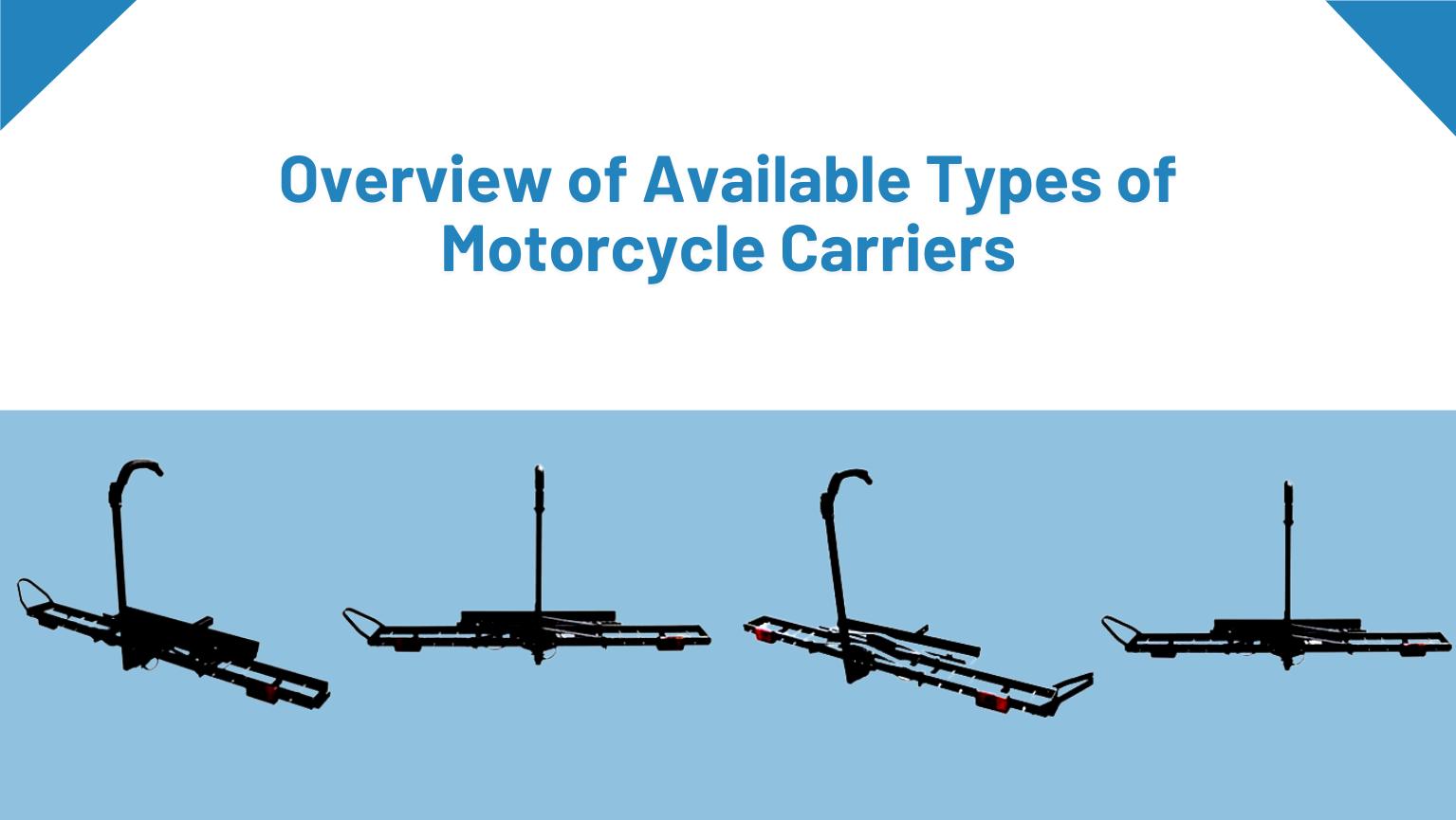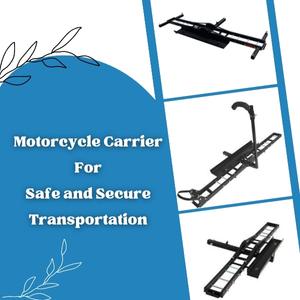Types of Motorcycle Carriers: Choosing The Best One
Are you looking for a reliable and safe way to transport your motorcycle? A motorcycle carrier can be an excellent option for those who want to bring their bike with them on trips, move it to a new location, or store it away. But with different types of motorcycle carriers available in the market, it can be challenging to determine which is best suited for your needs. In this blog post, we’ll explore the various types of motorcycle carriers, factors to consider when choosing a carrier, the pros and cons of each type, and some tips for safe and secure motorcycle carrier use.

Types of Motorcycle Carriers
There are three primary types of motorcycle carriers:
- Hitch-Mounted Motorcycle Carriers: These carriers attach to the back of a vehicle using a hitch receiver. They typically have a ramp for loading and unloading the motorcycle, and some models can hold up to two bikes. Hitch-mounted carriers are easy to install and use, making them a popular choice among motorcycle enthusiasts.
- Trailer Motorcycle Carriers: These carriers are designed to be towed by a vehicle and can transport multiple motorcycles. They can be enclosed or open, and some models have features like tie-downs, chocks, and ramps to secure motorcycles. Trailer carriers are more expensive and require more storage space, but they provide a high level of security for your motorcycle.
- Truck Bed Motorcycle Carriers: These carriers fit in the bed of a truck and can hold one or two motorcycles. They are relatively easy to load and unload and offer some level of security as the motorcycle is enclosed within the truck bed. However, truck bed carriers can limit the use of the truck bed for other purposes.
Factors to Consider When Choosing a Motorcycle Carrier
When selecting a motorcycle carrier, there are several factors you should consider:
- Motorcycle Weight and Size: Make sure the carrier you choose can handle the weight and size of your motorcycle.
- Vehicle Compatibility: Ensure that the carrier you select is compatible with your vehicle’s make and model.
- Ease of Loading and Unloading: Consider how easy it is to load and unload your motorcycle onto the carrier.
- Carrier Durability and Stability: Look for a stable, durable carrier that can withstand long-term use.
- Price and Budget: Determine how much you’re willing to spend on a motorcycle carrier.
Pros and Cons of Each Motorcycle Carrier Type
Each motorcycle carrier type has its advantages and disadvantages:
- Hitch-mounted carriers are easy to use, affordable, and don’t require much storage space. However, they may limit your vehicle’s access to the rear.
- Trailer carriers offer maximum security, can transport multiple bikes, and provide more storage space. However, they are expensive and require more storage space.
- Truck bed carriers are relatively easy to use, provide some level of security, and don’t take up additional storage space. However, they may limit the use of the truck bed for other purposes.
Best Motorcycle Carrier for Your Needs
To choose the best motorcycle carrier for your needs, you should:
- Determine Your Motorcycle Carrier Needs: Consider the type of trips you’ll be taking and the size and weight of your motorcycle.
- Evaluate Carrier Options: Review the various motorcycle carrier types, and assess their features, advantages, and disadvantages.
- Make the Final Decision: Choose the carrier that best suits your needs, preferences, and budget.

Tips for Safe and Secure Motorcycle Carrier Use
To ensure your motorcycle is safely and securely transported, you should:
Properly Load and Unload Your Motorcycle: Use a loading ramp, tie-down straps, and wheel chocks to secure your motorcycle safely.
Different Chart of Types of Motorcycle Carriers
Motorcycle Carrier Type | Hitch-Mounted | Trailer | Truck Bed |
Capacity | 1-2 bikes | Multiple bikes | 1-2 bikes |
Loading and unloading | Easy | It can be more difficult | Easy |
Security | Moderate | High | Moderate |
Storage | Low | High | Low |
Vehicle access | Limited | Limited | Unrestricted |
Price range | $100-$500 | $1,000-$5,000+ | $100-$500 |
Note: This chart is based on generalizations and may not apply to all carriers in each category. Additionally, price ranges may vary depending on brand, size, and features.
This chart helps you compare the different types of motorcycle carriers and choose the best one for your needs!
Heavy Duty Hitch Motorcycle Carrier
A heavy-duty hitch motorcycle carrier is an excellent option for those with larger motorcycles or those who plan to transport their bike frequently. These carriers are made of heavy-duty materials like steel or aluminum and can withstand the weight of larger motorcycles. They typically have a higher weight capacity than standard hitch carriers and provide more stability during transport. Many heavy-duty hitch carriers also have additional safety features like locking mechanisms and tie-down straps to ensure the motorcycle stays secure during transport.
When choosing a heavy-duty hitch motorcycle carrier, it’s important to consider the weight capacity, compatibility with your vehicle, and the size and weight of your motorcycle. These carriers are typically more expensive than standard hitch carriers, so it’s important to factor in the cost when deciding. Additionally, it’s essential to ensure the carrier is compatible with your vehicle’s hitch receiver and that it can support the carrier’s and the motorcycle’s weight during transport.
Conclusion
In conclusion, choosing the right motorcycle carrier can make all the difference in safely and securely transporting your bike. Consider weight capacity, compatibility, safety features, and durability when selecting a carrier. By understanding the different types of carriers available and weighing the pros and cons of each, you can choose the best one to fit your needs. Whether you’re hauling your motorcycle across the country or just to the next town over, a quality carrier can give you peace of mind and ensure that your bike arrives safely and in one piece.
FAQ's
- What is the weight capacity of a typical motorcycle carrier?
Motorcycle carriers come in a range of weight capacities, with some models designed to hold just one motorcycle and others able to support multiple bikes. The weight capacity of a carrier can vary from a few hundred pounds to over 1,000 pounds, so it’s important to choose a carrier that can handle the weight of your motorcycle.
- What is the best motorcycle carrier for long trips?
The best motorcycle carrier for long trips will depend on various factors, including the size and weight of your motorcycle, the carrier you prefer, and compatibility with your vehicle. Some carriers are more stable and secure than others, which can be important for longer trips. Additionally, carriers with additional safety features like locking mechanisms and tie-down straps may provide more peace of mind during transport.
- Are trailer hitch carriers for motorcycles easy to install?
Trailer hitch carriers for motorcycles can be relatively easy to install, but it’s important to ensure you have the right hitch receiver for your chosen carrier. Some carriers may require additional equipment or modifications to your vehicle to ensure a proper fit. Additionally, loading and unloading the motorcycle onto the carrier can take some practice.
- What is the cost comparison between different types of motorcycle carriers?
The cost of a motorcycle carrier can vary widely depending on the type, size, and features of the carrier. Hitch-mounted carriers can range from around $100 to $500, while trailer carriers can cost between $1,000 and $5,000. Truck bed carriers are generally less expensive, ranging from around $100 to $500. It’s important to consider the carrier’s cost of its features and durability.
- Can motorcycle carriers be folded for storage?
Some motorcycle carriers are designed to be foldable, which can be convenient for storage when not in use. However, not all carriers have this feature, so it’s important to check the product specifications before making a purchase. Foldable carriers can be a good option if you have limited space for storage or if you only plan to use the carrier occasionally.

